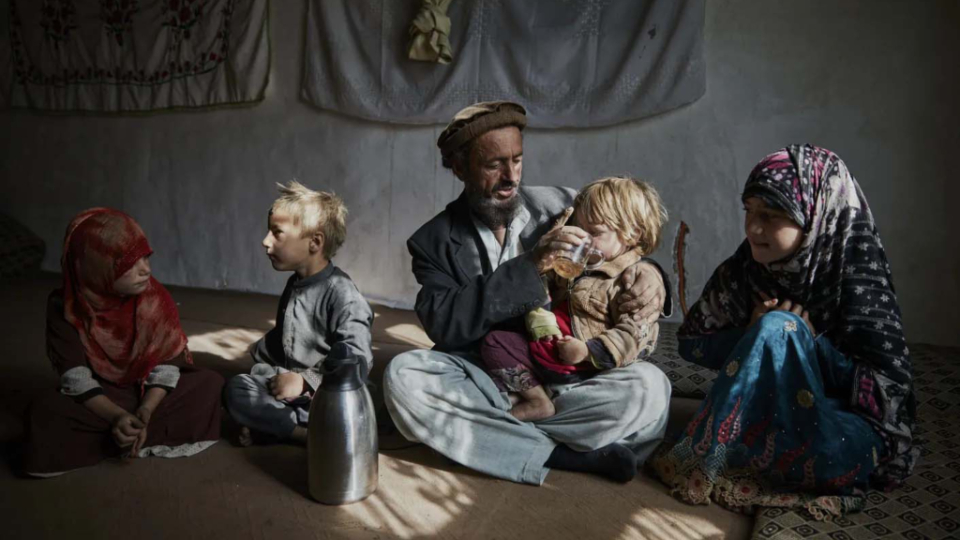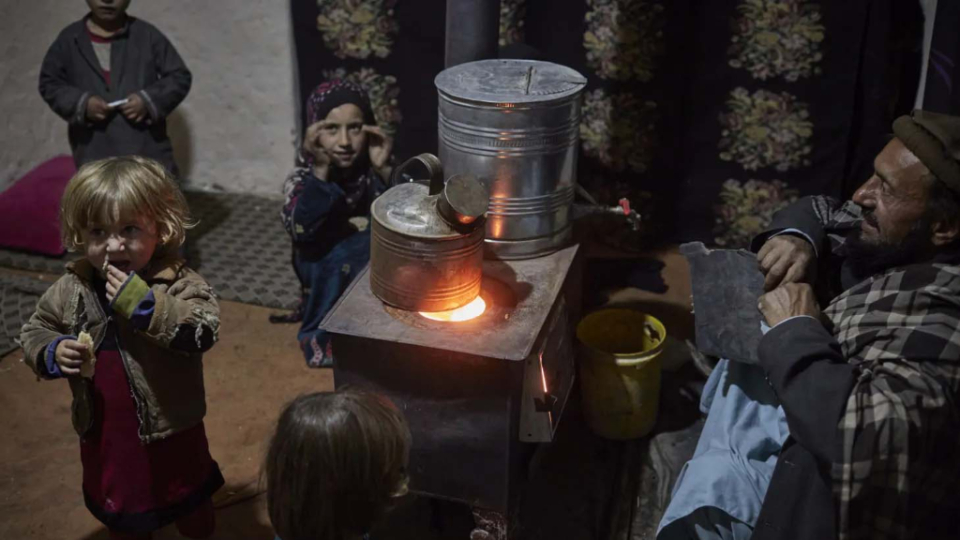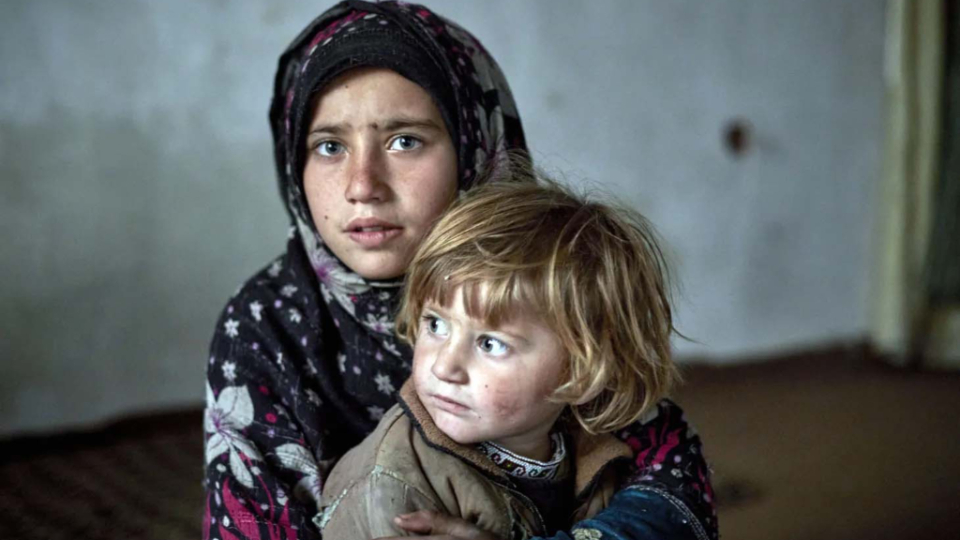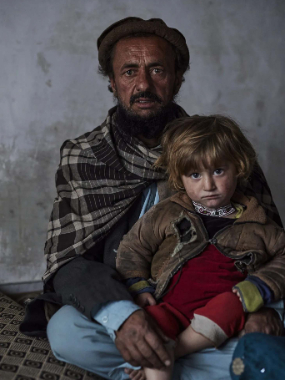
UNHCR-Kabul-refugees-1
Mullah Ahmed (name has been changed for protection) and some of his children inside their temporary home in Kabul. One thousand vulnerable families in the Afghan capital have received cash assistance for the winter. The Church of Jesus Christ of Latter-day Saints is supporting UNHCR in these efforts. Photo by Andrew McConnell, UNHCR, courtesy of Church News.All rights reserved.
This story appears here courtesy of TheChurchNews.com. It is not for use by other media.
By Mary Richards, Church News
Mullah Ahmed — whose name has been changed — his wife and nine children fled their home in Jalalabad, Afghanistan, in August 2021, shortly after the transition of government.
They moved into a house in Kabul that was abandoned by its owner, who had fled the country during the Taliban takeover. Many displaced families live in such homes and look after the property with the blessing of the owner.
“The winters are hard here when the snow falls. We don’t have enough blankets, and our stove is old,” shared Ahmed.
Ahmed and his family are among more than 800,000 Afghans who were newly displaced inside their own country.
Afghans make up one of the largest refugee populations in the world — more than 40 years of conflict, natural disasters, chronic poverty and food insecurity have forced 6.3 million people, nearly 16% of the country’s total population, to flee their homes, explained Lacey Stone, senior director for partnerships at USA for UNHCR.
The Church of Jesus Christ of Latter-day Saints is supporting UNHCR to help displaced people in Afghanistan — especially families, as 80% of newly displaced Afghans are women and children.
Ahmed is one of the 836,000 people of concern to receive cash assistance from UNHCR in 2021. Ahmed said with the money, he was able to purchase blankets and fuel.
“The cash assistance is very important, because my work stops in winter, as there is no construction,” Ahmed said. “So we need it to buy food and also warm clothes for the children.”

UNHCR-Kabul-refugees-2
Mullah Ahmed (name changed for his protection) and some of his children sit by the stove in their temporary accommodation in Kabul, Afghanistan. They were among 1,000 families who received cash payments from UNHCR. The Church of Jesus Christ of Latter-day Saints is supporting UNHCR in its efforts. Photo by Andrew McConnell, UNHCR, courtesy of Church News.All rights reserved.
UNHCR also quickly mobilized after the June 22 earthquake, distributing key shelter and household supplies to survivors. The organization continues to provide life-sustaining support to those displaced by the disaster, Stone said.
How the Church and USA for UNHCR Work Together
Stone said the Church “is a long-standing, consistent and generous partner” with USA for UNHCR. The Church and UNHCR have partnered together since 1991.
“This is a relationship USA for UNHCR does not take for granted,” she said. “It’s what sustains us as we work to build new partnerships and serves as a shining example for other faith-based organizations and foundations that are considering supporting our work.”
Earlier this year, the Church gave $4 million to UNHCR to help those displaced by the humanitarian crisis in Ukraine. The gift was projected to help an estimated 40,000 displaced families. The Church also included USA for UNHCR again in this year’s Light the World Giving Machines.
But it’s not just about the amount of money, Stone said. It’s the consistency of donations and dedication to providing aid to the underserved.

UNHCR-Kabul-refugees-3
Nine-year-old Fauzia and her three-year-old sister Aseela (names have been changed for their protection) in their temporary accommodation in Kabul, Afghanistan. Their family received a cash payment from UNHCR, with funding support from The Church of Jesus Christ of Latter-day Saints. Photo by Andrew McConnell, UNHCR, courtesy of Church News.All rights reserved.
Collaboration between faith-based organizations and nonprofit groups works so well because they are typically aligned in their commitment to helping those in need, she said.
“Faith-based communities are often the first to respond to individuals, families and communities in the initial stages of a humanitarian crisis,” she said. “They respond by virtue of their presence, local knowledge, networks and assets in some of the most isolated and remote areas.”
UNHCR has taken steps to formalize best practices for partnering with faith-based organizations like the Church, with a statement of belief called “Welcoming the Stranger,” providing resources for working together.
Stone quoted the words of UN High Commissioner for Refugees Filippo Grandi: “As wars, conflict and persecution continue to force people to flee their homes, we seek the support of faith leaders and their communities. They are key in not only standing with and supporting refugees during their displacement but in addressing the root causes that gave rise to their flight.”
The Future in Afghanistan
Stone said the humanitarian crisis in Afghanistan is protracted and getting worse.

UNHCR-Kabul-refugees-4
Mullah Ahmed (name has been changed for his protection), his wife and nine children fled their home in Jalalabad, Afghanistan, in August 2021 and moved into a house in Kabul with the blessing of its owner, who fled after the Taliban takeover. Cash assistance from UNHCR helped the family get fuel and clothing for the cold-weather months. Photo by Andrew McConnell, UNHCR, courtesy of Church News.All rights reserved.“Hunger and violence are rampant. Over half of the population are facing extreme hunger,” she said.
Access to education, shelter and heating fuel is inadequate. Afghanistan has also experienced numerous natural disasters in 2022, including drought, a major earthquake and flash floods. But crises like Afghanistan have “fallen out of the regular media cycle of attention.”
Stone said any donation will save lives and provide hope for millions of refugees around the world.
With winter coming again, Stone said UNHCR has significantly intensified its outreach, with targeted assistance helping families survive. Critical aid includes household items like blankets; stoves; solar lanterns; insulation kits; and support for heating, clothing and vital household supplies.
“UNHCR is committed to staying and delivering in Afghanistan,” she said.
Copyright 2022 Deseret News Publishing Company.